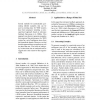Free Online Productivity Tools
i2Speak
i2Symbol
i2OCR
iTex2Img
iWeb2Print
iWeb2Shot
i2Type
iPdf2Split
iPdf2Merge
i2Bopomofo
i2Arabic
i2Style
i2Image
i2PDF
iLatex2Rtf
Sci2ools
NAACL
2010
2010
The Effect of Ambiguity on the Automated Acquisition of WSD Examples
Several methods for automatically generating labeled examples that can be used as training data for WSD systems have been proposed, including a semisupervised approach based on relevance feedback (Stevenson et al., 2008a). This approach was shown to generate examples that improved the performance of a WSD system for a set of ambiguous terms from the biomedical domain. However, we find that this approach does not perform as well on other data sets. The levels of ambiguity in these data sets are analysed and we suggest this is the reason for this negative result.
| Added | 14 Feb 2011 |
| Updated | 14 Feb 2011 |
| Type | Journal |
| Year | 2010 |
| Where | NAACL |
| Authors | Mark Stevenson, Yikun Guo |
Comments (0)

